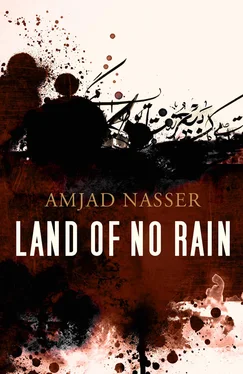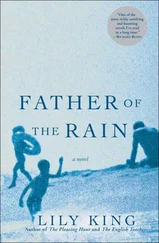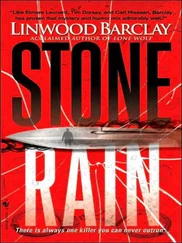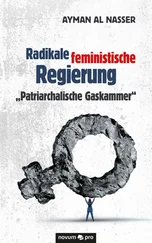Nasser Amjad - Land of No Rain
Здесь есть возможность читать онлайн «Nasser Amjad - Land of No Rain» весь текст электронной книги совершенно бесплатно (целиком полную версию без сокращений). В некоторых случаях можно слушать аудио, скачать через торрент в формате fb2 и присутствует краткое содержание. Год выпуска: 2014, Издательство: Bloomsbury Qatar Foundation Publishing, Жанр: Современная проза, на английском языке. Описание произведения, (предисловие) а так же отзывы посетителей доступны на портале библиотеки ЛибКат.
- Название:Land of No Rain
- Автор:
- Издательство:Bloomsbury Qatar Foundation Publishing
- Жанр:
- Год:2014
- ISBN:нет данных
- Рейтинг книги:4 / 5. Голосов: 1
-
Избранное:Добавить в избранное
- Отзывы:
-
Ваша оценка:
- 80
- 1
- 2
- 3
- 4
- 5
Land of No Rain: краткое содержание, описание и аннотация
Предлагаем к чтению аннотацию, описание, краткое содержание или предисловие (зависит от того, что написал сам автор книги «Land of No Rain»). Если вы не нашли необходимую информацию о книге — напишите в комментариях, мы постараемся отыскать её.
Land of No Rain — читать онлайн бесплатно полную книгу (весь текст) целиком
Ниже представлен текст книги, разбитый по страницам. Система сохранения места последней прочитанной страницы, позволяет с удобством читать онлайн бесплатно книгу «Land of No Rain», без необходимости каждый раз заново искать на чём Вы остановились. Поставьте закладку, и сможете в любой момент перейти на страницу, на которой закончили чтение.
Интервал:
Закладка:
You noticed that he raised his eyebrows in protest. So you told him, ‘Stop that. Do you think I don’t know who keeps writing the love letters, even if you don’t always send them? Don’t raise your eyebrows. Stop shaking your head and let me continue.’ He did in fact stop making those gestures of protest, but with a certain pain, which showed in his eyes. You felt sorry for him. To ease the situation, you told him, ‘Do you want to know how my meeting with Roula went?’ You saw his features relax and his hands, which were clasped tight across his chest, loosen up. You told him, ‘I’ll tell you, provided I can go back to my story. Will you promise me that?’ He nodded in agreement in a childish manner that made you feel even more sorry for him. You told him:
‘Firstly, it was you who loved her, not me. It’s true that I didn’t completely break free of you, if you’ll forgive the expression, because something of you survived inside me. But I don’t know exactly what it was. When I stood in front of the mirror I felt anxious inside. I took a tranquilliser. Then I relaxed a little. But it wasn’t the tranquilliser that made me feel that the whole business was something to do with someone else. With you, to be precise. Because the pill wasn’t hallucinogenic. There are such pills that make one hallucinate and see things that in reality don’t exist. No, it was an ordinary tranquilliser. And I’ve grown used to taking them to calm my nerves and make the images that go through my mind less intense. It’s a disease or a symptom that’s called “depression” and it’s common these days, but these pills in any case no longer do me much good. It was you who stood looking at me in the mirror. Don’t wave your hand in denial. Don’t do it. Because I know it. Why? Firstly, because we really have become different people — the one here that’s you, and the one there that’s me. Even when I came back I didn’t become you, and I don’t think we will become one again. Secondly, if it was up to me, I wouldn’t have let my eyes climb up her legs and try to move her dress up her golden thighs, so much so that I lost track of what she was saying. If it mattered to me as much as it mattered to you, I would have kept looking at her face, despite the ravages of ruthless time. Thirdly, she referred to the fact that she always sees Younis al-Khattat. She doesn’t need a newspaper or magazine to see him and be aware of him, because he never left here as I did. Yes. She said she’s kept every line he wrote. Every sprig of lavender he picked from the flowerbeds in the Hamiya gardens. The newspaper in which the poem ‘Lady of the City’ appeared. She said these things were her treasures. That she called her first son Badr after his favourite poet. And then it doesn’t require extraordinary intelligence to realise that I’ve changed, become a different person in fact, with a different life and different relationships and interests from Younis al-Khattat. This didn’t escape her. Because she loved Younis al-Khattat, and Younis al-Khattat isn’t me. So let me go back to the first story. You don’t seem enthusiastic but listen to me anyway.
‘The local newspapers started to write about me, but as someone other than you, after the Grandson died and the censorship of publications was lifted. You know from the papers that I travel often and I’m invited to conferences and meetings. Sometimes I recite poetry that doesn’t follow the traditional rules of metre or rhyme, poetry such as you’ve never written and that maybe you don’t consider poetry, or I make fiery comments about change and the transition from the old slow-moving times to new times (I no longer do this because I’ve been losing faith in many things), or I take part in meetings on narrative and biography. Anyway, some years ago I was invited to a conference in an old city with houses that lean against each other and with markets and alleyways that crisscross like a tangle of intestines. Like a body, it had orifices that were open and hidden at the same time. This is roughly how it was described by a foreign woman who visited it and was cured of insomnia and chronic emotional trauma. In my case, I can say that the houses, the alleyways and cafés of the city, where people had lived and breathed non-stop for a thousand years, brought back memories of cities where I had lived shortly after we split. It was the smell of mint, rosewater and marzipan from the houses and cafés in the afternoons that set my memory working in reverse. So did the smell of manure from the animals that were still the only means of transport in the markets and streets, which were so narrow that they hardly allowed two people to pass. Don’t be surprised that such a city still exists on the face of our wretched planet. What I say is not a figment of my imagination, because that doesn’t obey me much any longer. The city exists, exactly as I’m describing it to you. I can imagine right now the man who makes leather shoes, whose small shop smelt of tanning, sitting on the doorstep of his house (I don’t know how I found my way there through the maze of alleyways and interlocking houses), drinking mint tea from a greenish glass veined with golden lines, smoking cigarette after cigarette and staring perhaps at the same stars we can see arrayed above us here. I can imagine that. When he found out I hailed from a country near the Holy Land, he invited me to his house in the hope I would bring him good luck. Imagine? Me bring him good luck, when I’m weighed down by doubts and sins, a mixture of atheism and an early religious upbringing!’
He looked like he was about to break his promise to listen to you till the end. He seemed to be growing annoyed. He probably wanted you to get on with the story rather than twisting and turning around it, so you continued:
‘No story is straightforward. Time isn’t straightforward either. Because time and words and emotions wrap around each other like the layout of that ancient city, or like some of your father’s calligraphic designs, which turn words into eternal riddles. But, in deference to your impatience, which remains unchanged, I will summarise:
‘Our hosts put us up in a hotel that was once the home of a city notable but had been sold by his grandchildren to some of the investors who flocked to the city when it became an international tourist destination. Now you can hear people jabbering in multiple languages in the city’s lanes and markets, where one might easily get lost for ever. The hotel, I mean the home of the notable, was built in the style of the great kingdoms that came and went in that region. It had a high wooden gate carved with images of imaginary birds and delicate flowers that one could almost smell. A mounted horseman could have ridden through the gate without bending down. In the middle of the courtyard there was a pool, with a fountain in the centre. The tiles on the floor of the courtyard and in the pool were very small. The patterns they formed changed every ten or fifteen tiles, depending on the angle of inclination of the sun, and even in the dark they reflected colours that varied between green and blue and pale yellow, as though the pool and the tiles that were in it and around it reflected a traveller’s dream about a place he sought but could not reach. In the courtyard I found people I knew and others I didn’t. I was given an upper room that overlooked the pool. In fact all the rooms overlooked the pool. I put my bag in the room. Leaning over the marble basin, I washed my face slowly with the water of the city. Because, despite everything, I still see water as a source of good luck, just as my grandmother did. I see water as able to bring the dead back to life and, when I wash, I repeat some of her ritual prayers silently to myself. Then I went down to the courtyard. The guests were milling around, chatting away at various levels and pitches, without them noticing the changing patterns of the tiles or the shifts in their colours as the sun moved across the sky. I drank a frothy mint tea, served by a boy in traditional costume, carrying a teapot that never ran dry on a pale silver tray that never ran out of glasses. I stood with a friend who comes from a country close to our country. Behind my back I heard someone say, “Have you seen Adham Jaber?” I looked back. The other person pointed at me, and the person who had asked said, “No, that’s not him.” Then they melted into the crowd. My friend noticed that something had come over me. “Is there a problem?” he asked. “No,” I said. Then, after a short silence, I added, “Did you hear someone mention my name?” “No, I didn’t,” he said. I thought that what I had heard was a hallucination, like the ones I have that are a mixture of fantasy and reality. But in the lobby, in the lecture hall, on our magical tour through the warren of twisting lanes in the old city, and in the restaurant, I still felt that there were eyes pinned on me at all times. I heard my name mentioned several times, but they were not referring to me. I didn’t think much about it. I left it as it was in its raw state. In all its mystery, real or imaginary. Sometimes I do that. I just let the feeling sink in without allowing my mind to analyse it. But the eyes pursuing me had come closer and grown more piercing. I could almost feel them penetrating every inch of me. The breath I could feel behind my back, which disappeared when I turned around, was almost stinging. Breaths interspersed by a feeble wheezing sound, from lungs ruined by nicotine. I hadn’t done anything here to deserve being monitored by anyone. Nothing real called for that, especially in this place. Because I’m far from Hamiya, very far, and what I did there is of no interest to anyone here. On the eve of the conclusion of the conference, I had a headache. You don’t know those headaches that knock me out. I wanted to have a rest in my room before joining the group for the traditional closing ceremony that the organisers had prepared. I went to reception to get the key to my room. The receptionist was speaking to a man who, from the back, seemed to be on the stout side. I heard the receptionist tell the man with some impatience, “Sir, there’s no one on the guest list by that name, and the only person from that city is Mr Younis.” Then the receptionist saw me approaching. The other man turned to see where the receptionist was looking, and the receptionist said, “There he is!” Before I could reach the wooden counter behind which he was standing, the receptionist asked me, as if pleading for help, “Mr Younis, has anyone other than you come from the city where you live?” I looked straight at the man, who resembled to some extent the man whose picture was published with the article praising my book. “No,” I said, “I’m the only one.”
Читать дальшеИнтервал:
Закладка:
Похожие книги на «Land of No Rain»
Представляем Вашему вниманию похожие книги на «Land of No Rain» списком для выбора. Мы отобрали схожую по названию и смыслу литературу в надежде предоставить читателям больше вариантов отыскать новые, интересные, ещё непрочитанные произведения.
Обсуждение, отзывы о книге «Land of No Rain» и просто собственные мнения читателей. Оставьте ваши комментарии, напишите, что Вы думаете о произведении, его смысле или главных героях. Укажите что конкретно понравилось, а что нет, и почему Вы так считаете.












